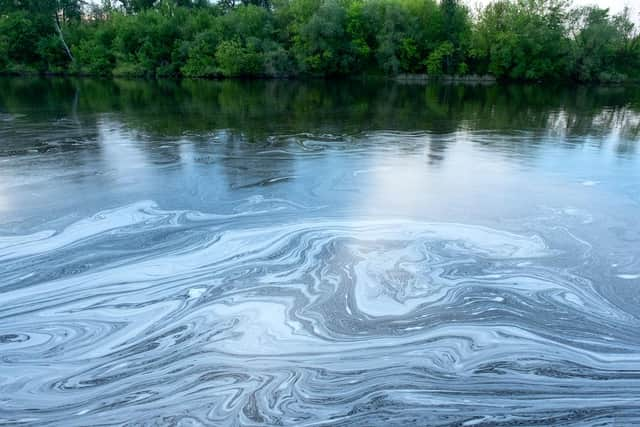Environmental crime: more than 40 councils in England and Scotland prosecuted for pollution
This article contains affiliate links. We may earn a small commission on items purchased through this article, but that does not affect our editorial judgement.
and live on Freeview channel 276
More than 40 councils across England and Scotland have been prosecuted for environmental crimes over the last two decades, exclusive NationalWorld analysis reveals.
Ranging from pollution of waterways to disposing of waste illegally, the historical crimes have resulted in councils being slapped with £386,100 worth of fines.
Advertisement
Hide AdAdvertisement
Hide AdWe want to hear from you: let us know what you think about this story and be part of the debate in our comments section below


Earlier this week we revealed how water companies were the biggest culprits when it comes to environmental crime.
Now we can expose which councils have also been prosecuted for polluting England and Scotland’s environments – and had to stump up taxpayers’ money in retribution.
The offending councils
The councils were all prosecuted by the two nations’ environment watchdogs – the Environment Agency and the Scottish Environment Protection Agency (SEPA) respectively – between January 2000 and May or June 2020.


Advertisement
Hide AdAdvertisement
Hide AdNationalWorld’s analysis of Environment Agency data reveals 33 English councils have been prosecuted for environmental crime since 2000.
In total, there have been 42 separate prosecutions relating to 59 charges, resulting in fines of £329,000. A single prosecution can involve multiple charges.
Birmingham City Council has been prosecuted the greatest number of times – three times for three separate offences. It has been fined a total £34,500.
Braintree District Council had the greatest single fine for a charge – £50,000, issued in 2006 for an offence under Section 85 (1) of the Water Resources Act 1991. The incident occurred in 2002 when a chemical called Tributyltin – a substance which is highly toxic to marine life, once used as a barnacle-repellent paint on ships before a global ban in 2008 – entered the River Blackwater in Essex. The Environment Agency data shows the incident was placed in the highest category of harm for environmental crime, meaning it caused a “major, serious, persistent or extensive impact” on the environment, people or property.
Advertisement
Hide AdAdvertisement
Hide AdThe council and the two companies responsible for the spillage were fined.
In Scotland, eight councils have been prosecuted 13 times since 2000 with fines amounting to £57,100, according to prosecution data released from SEPA under an Environmental Information Regulation request.
Dumfries and Galloway Council and Glasgow City Council have been prosecuted the greatest number of times – three each.
Glasgow City Council was fined a total £11,500 and Dumfries and Galloway Council was fined £9,000.
‘Deeply regret this incident happened’
Advertisement
Hide AdAdvertisement
Hide AdA Birmingham City Council spokesperson said: “All three of these cases occurred two decades ago.
"We always aim to learn from incidents such as these, which are very rare, to minimise future risk, as evidenced by the time that has elapsed since the last prosecution.”
The council claimed that being the largest council area in the country by population means they will “inevitably” come at or near the top of statistical tables relating to local authorities.
A Braintree District Council spokesperson said: “The chemical entered into the water course after a drum spilt at the Anglia Cargo Terminal in Coggeshall. We were asked to attend the site, about a month after the spillage, to unblock the drains after flash flooding had occurred in the area. Unfortunately, the chemical was still present in the drainage system when we went to unblock the drains and it was flushed into the local river.
Advertisement
Hide AdAdvertisement
Hide Ad"We care about the health of our rivers and deeply regret that this incident happened.”
Glasgow City Council and Dumfries and Galloway Council were also approached for comment.
| Council | Number of times prosecuted | Fines |
| Aberdeen City Council | 1 | £6,600 |
| Aberdeenshire Council | 2 | £18,000 |
| Bedfordshire County Council | 1 | £12,000 |
| Birmingham City Council | 3 | £34,500 |
| Blackburn With Darwen Borough Council | 1 | £10,000 |
| Braintree District Council | 1 | £50,000 |
| Cornwall County Council | 1 | £1,000 |
| Devon County Council | 1 | £5,000 |
| Dumfries and Galloway Council | 3 | £9,000 |
| Durham County Council | 2 | £10,000 |
| East Riding Of Yorkshire Council | 1 | £18,000 |
| Glasgow City Council | 3 | £11,500 |
| Hampshire County Council | 1 | £3,000 |
| Hyndburn Borough Council | 1 | £5,000 |
| Knowsley Metropolitan Borough Council | 1 | £5,000 |
| Mid Devon District Council | 1 | £3,000 |
| New Forest District Council | 1 | £6,000 |
| Newcastle City Council | 1 | £25,000 |
| North Cornwall District Council | 1 | £500 |
| North Lanarkshire Council | 1 | £4,000 |
| North West Leicestershire District Council | 1 | £7,500 |
| Northamptonshire County Council | 2 | £32,000 |
| Nottinghamshire County Council | 2 | £12,000 |
| Oldham Metropolitan Borough Council | 1 | £0 |
| Plymouth City Council | 2 | £10,000 |
| Sheffield City Council | 2 | £7,500 |
| Shetland Islands Council | 1 | £500 |
| South Lakeland District Council | 1 | £10,000 |
| South Norfolk Council | 2 | £3,500 |
| Stirling Council | 1 | £7,500 |
| Stockton Borough Council | 1 | £5,000 |
| Swindon Borough Council | 1 | £7,000 |
| Tendring District Council | 1 | £7,500 |
| The Moray Council | 1 | £0 |
| Thurrock Borough Council | 1 | £2,000 |
| Vale Royal Borough Council | 1 | £5,000 |
| Warrington Borough Council | 1 | £7,000 |
| West Lindsey District Council | 1 | £5,000 |
| West Sussex County Council | 1 | £1,000 |
| Winchester City Council | 2 | £1,000 |
| Wokingham District Council | 1 | £18,000 |
Protecting England’s environment
A spokesperson for the Environment Agency said: “We take our responsibility to protect the environment very seriously. We respond to every incident reported to us and take strong enforcement action against those who break the rules. We use our monitoring to target interventions and justify investment.
Advertisement
Hide AdAdvertisement
Hide Ad“The regulations are clear and are enforced robustly – we will always seek to hold those responsible for environmental harm to account.”
Due to the historic nature of the crimes, SEPA declined to comment.
A message from the editor:
Thank you for reading. NationalWorld is a new national news brand, produced by a team of journalists, editors, video producers and designers who live and work across the UK. Find out more about who’s who in the team, and our editorial values. We want to start a community among our readers, so please follow us on Facebook, Twitter and Instagram, and keep the conversation going.
Comment Guidelines
National World encourages reader discussion on our stories. User feedback, insights and back-and-forth exchanges add a rich layer of context to reporting. Please review our Community Guidelines before commenting.
